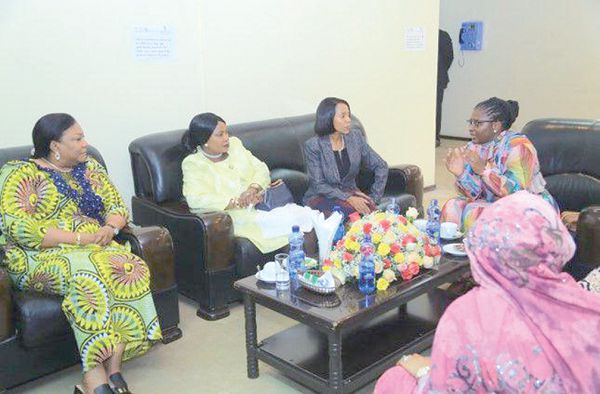
[ad_1]

Mrs. Rebecca Akufo-Addo (left) with her colleague, the first ladies, during a discussion in the VIP waiting area of the old building of the AU
The First Lady, Ms. Rebecca Akufo-Addo, has been selected as "co-champion" of a continental campaign to get African countries to ban plastic products that generate waste.
The campaign, whose theme is "Ban Plastics for Pollution-Free Africa," was launched by the Department of Rural Economy and Agriculture (DREA) of the US Environmental Protection Commission. African Union (AU) to rid African cities of plastic waste.
One of its goals is to raise awareness and awareness of the impact of plastics in Africa.
It is also to help share experiences, strategies and actions undertaken at different national and regional levels.
Mrs. Akufo-Addo and the First Lady of Gambia, Ms. Fatoumata Bah Barrow, champion of the campaign in West Africa, will plead for a West Africa free of plastic pollution.
Other champions
The first ladies of Congo and Gabon are respectively champion and co-champion for Central Africa; The first ladies of Rwanda and Kenya are the champions and co-champions of East Africa, while the first ladies of Egypt and Mauritania are the champions and co-champions of champions of North Africa.
The campaign also has the first ladies of Angola and Botswana as champion and co-champion, respectively, for Southern Africa.
To date, 12 African countries, including The Gambia, Guinea-Bissau, Benin, Mauritania, Mali, Cameroon, Senegal and South Africa, have banned the use of plastics and replacement such as biodegradable materials.
Risk to human health
Ambbadador Josefa Sacko, Commissioner of the African Union (AU) for DREA, at a high-level session on the campaign in Addis Ababa on the sidelines of the 22nd Ordinary General Assembly of the Organization First African Ladies Against HIV and AIDS (OAFLA), said that about 90% of all garbage floating on the surface of the sea would emanate from plastics.
She added that plastics affect the entire biological spectrum, including posing risks to human health and wildlife, and that, therefore, "combating plastic pollution requires individual and collective efforts, while involving government institutions, civil society organizations, research-based organizations, research institutes, among others ".
Ambbadador Sacko said the First Ladies had been carefully selected to lead the campaign to ban plastics and thus reduce their negative impact on the continent.
She added that the AU was collaborating with the United Nations Environment Program (UNEP) in the campaign and had begun to engage with other partners to support this cause.
Threat to the environment
The First Lady of Kenya, Mrs. Margarette Kenyatta, who is also President of OAFLA, said that the fight against plastic pollution would require strong legislation and capacity building in advocacy and advocacy. education.
She added that environmental pollution was placing a heavy burden on women and children, who were most affected when the environment was degraded.
Ms. Juliette Biao, Director and Regional Representative of the UNEP Office for Africa, said that pollution killed nine million people worldwide in 2015, or 16 percent of all deaths that year.
Pollution, she said, is the main cause of noncommunicable diseases, adding that it was therefore necessary to end this disease to avoid the high number of diseases recorded on the continent.
Citing Kwegyir Aggrey's famous quote in Ghana, "If you educate a man, you educate an individual, and if you educate a woman, you educate a nation," Dr. Biao said the collaboration between African First Ladies was a step in the right direction in the fight against the current plastic waste pollution that had engulfed the major cities of the continent.
Panel speakers
Ms. Neo Masisi, first lady of Botswana, said at a round table that the ban on the use of plastic was a solution to the problem of poverty and pollution in Africa.
Antoinette Sbadou Nguesso, First Lady of Congo, said that the First Ladies had a role to play in the areas of advocacy and education to raise awareness of the need to stop polluting the country. 39; environment.
International partners
The head of the Japanese Mission to the AU, Mr. Fumio Shimizu, badured Japan of its commitment to contribute to the reduction of pollution from plastic waste in Africa.
He added that the problem called for the reduction, reuse and recycling of plastic waste on the continent.
Acting Director and Head of Unit for International Cooperation and Development of the European Union for East Africa, Mr Hans Stausboll, said that the Africa was an essential ally for the achievement of climate change in the world.
He called for the mobilization of the continent's citizens and their involvement in the effort to create a pollution-free environment.
writers This email address is protected from spam. You must enable JavaScript to view it.
[ad_2]
Source link